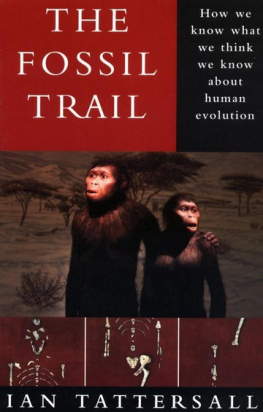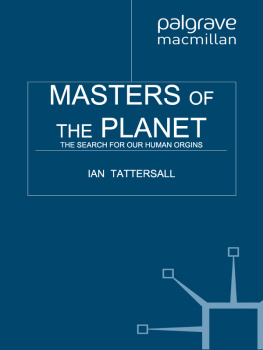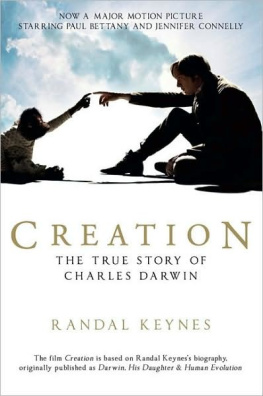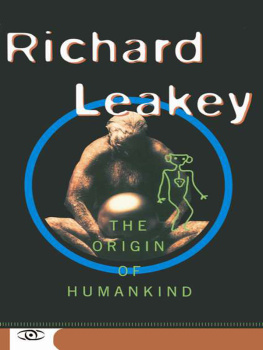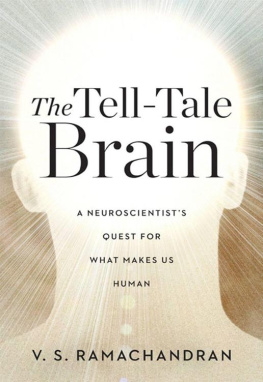The Strange Case of the Rickety Cossack
And Other Cautionary Tales from Human Evolution
Ian Tattersall

The author and publisher have provided this e-book to you for your personal use only. You may not make this e-book publicly available in any way. Copyright infringement is against the law. If you believe the copy of this e-book you are reading infringes on the authors copyright, please notify the publisher at: us.macmillanusa.com/piracy.
With gratitude to Elwyn Simons and Niles Eldredge
(both blameless).
Contents
Preface
I am approaching the end of a long career as a paleoanthropologista student of human evolutionwith a nagging feeling of incompletion. Not that I would trade that career for anything: it has been hugely fulfilling and has provided me with an endless supply of incidenthowever unwanted on occasionthat has guaranteed the absence of boredom. Even more important, over the last half century profound changes in the field of paleoanthropology have made it a wonderfully exhilarating place to be. Most obvious among these are the huge additions made to the human fossil record, the traditional archive of our evolutionary past, nowadays closely rivaled by the advent of powerful molecular genetic techniques that allow us alternative ways of glimpsing our biological history. But numerous other new technologies have also given us unprecedented approaches to clarifying the ages and the lifeways of our various hominid precursors, and novel viewpoints on how evolution works have offered us new ways of thinking about our biological record.
Yet for all the excitement, in some respects paleoanthropology has remained curiously static compared to other areas of paleontology. Indeed, it seems fair to say that todays paleoanthropologists are in general a lot more like their precursors of the mid-twentieth century than, say, modern dinosaur or fish paleontologists are. Perhaps this is inevitable, since it is particularly difficult to escape from preconception when looking at our own egocentric species, Homo sapiens, and its extinct relatives. What is more, we tend to scrutinize the evidence for our own past in considerably more detail than we do that of other species. Still, for all the extenuating circumstances, the science of human evolution has not borne the burden of history lightly; in this field, more than most, what we think today continues to be very intensely influenced by what we thought yesterdayand the day before that.
I realized this fact with particular force a few years ago while writing Masters of the Planet, a book in which I attempted to put together a coherent account of just how, from a remote starting point as a bipedal but otherwise unremarkable ape, we human beings contrived to become, rather rapidly, the extraordinary creatures we are. As the writing progressed I realized that if I was to provide a narrative of human evolution that would make ready sense, I would have to omit any substantial mention of the convolutedand in many ways highly insularhistories of discovery and ideas in paleoanthropology. This was a serious omission since, given the sheer weight of paleoanthropologys historical burden, it left a huge gap in the story. It is that gap that led to the book you are holding now, which is in effect a complement to the earlier one. It is an idiosyncratic history of paleoanthropology that is intended to show just how received wisdoms about human evolution have always conditioned what we have believed about our own origins, often in the face of compelling evidence to the contrary. For the half century or so during which I have actively participated in the field, I have tried to make this point by describing the development of my own ideas about evolutionary processes and about the fossil record they have produced, while enlivening the narrative with some anecdotal experience. My hope is that by the books end I will have convinced you that how we interpret the process by which we became human really does matter, because it so greatly impacts our view of ourselves.
Perhaps you will allow me to begin with what may initially appear to be a digression.
Prologue
The sail first appeared as a tiny triangle above the shimmering horizon. Gradually it resolved into the image of a rickety dhow, butting slowly nearer through the ocean swells. At first, though, I barely noticed it. I had other preoccupations. Sitting forlornly on a gleaming deserted beach on Mohli, the smallest of the Comoro Islands, which sit in the middle of the vast Mozambique Channel between Madagascar and Africa, I was actually wondering if I would ever see the outside world again.
Three weeks earlier, I had arrived in Moroni, capital of Grande Comore Island, after one of the more hair-raising aircraft rides of my life. I had shown up early in the morning at Dar es Salaam airport, in neighboring Tanzania, for the scheduled short flight aboard one of Air Comores two ancient DC-4s. Once at the airport I was told that Air Comores hadnt actually been seen for a month, but that if I felt optimistic I could wait. So I waited, along with two unkempt French youths, one of whom sported a bushy golden beard and long, lank hair that made him resemble that weird image on the Shroud of Turin. Hours of desultory conversation later, a battered DC-4 with a star and crescent on its tail finally rolled up to the ramp and spluttered to a stop in the blazing midday sun. For what seemed an eternity, nothing happened. Finally, the flight to Moroni was called, and we three optimists duly trooped out to the aircraft. As we climbed the rolling steps its door opened, emitting a blast of hot, fetid air that almost knocked us off our feet. Inside, we found a cabin crammed with heat-prostrated passengers, and our way forward blocked by oil drums lashed down along the aisle. Not an empty seat in sight. We looked around at the cabin steward. He nodded at the barrels.
Once we were settled uncomfortably on our improvised seats, the door closed and the aircraft taxied out. After what felt like an eternity, it staggered into the air. Circling up to a cruising altitude of what seemed no more than a couple thousand feet, we headed out over the choppy Mozambique Channel, every whitecap sharply visible below us. Arriving in Moroni, a bone-jarring landing took up the entire runway, and after we reached the terminal it took me awhile to disentangle myself from all the junk in the aircraft interior. By the time I finally got inside the tiny building, the Air Comores captain was already seated at the bar at the end of the narrow room, fiercely grasping a tumbler brimming with neat whisky.
Recognizing him from earlier timesAir Comores flight crews in those days were grizzled veterans who had flown Dien Bien Phu, Biafra, and Katanga, had seen it all, and usually liked to reminisceI greeted him warmly. He didnt respond in kind. Instead, he raised his eyes from his glass, fixed me with a wide-eyed stare, and said, We were two tons over maximum gross weight on takeoff, and if one engine had so much as hiccoughed, wed all be dead! Taken aback, I said, But, Monsieur X, why do you fly under these conditions? His answer: Monsieur, I am 75 years old. Who else will pay me to fly?
That was the Comoros in a nutshell. Assembled one by one into the French Empire at various dates between 1840 and 1912, the four tiny islands of the archipelago (Grande Comore, Mohli, Anjouan, and Mayotte) had earlier been independent sultanates lying at the far end of the Arab trading route down the east African coast from Oman. During colonial times they were administered as a dependency of the huge but equally remote French island of Madagascar, making them about as forgotten and neglected as its possible to be. But isolation and tranquility are not the same thing; and once Madagascar had achieved its own independence in 1960, the Comoros embarked on a tortuous history, the complexities of which have been far out of proportion to the archipelagos size.
Next page

